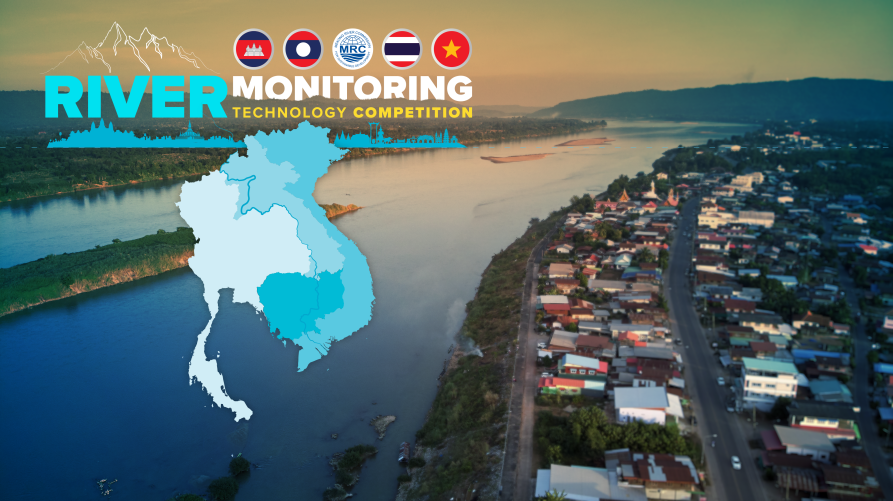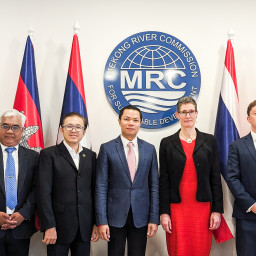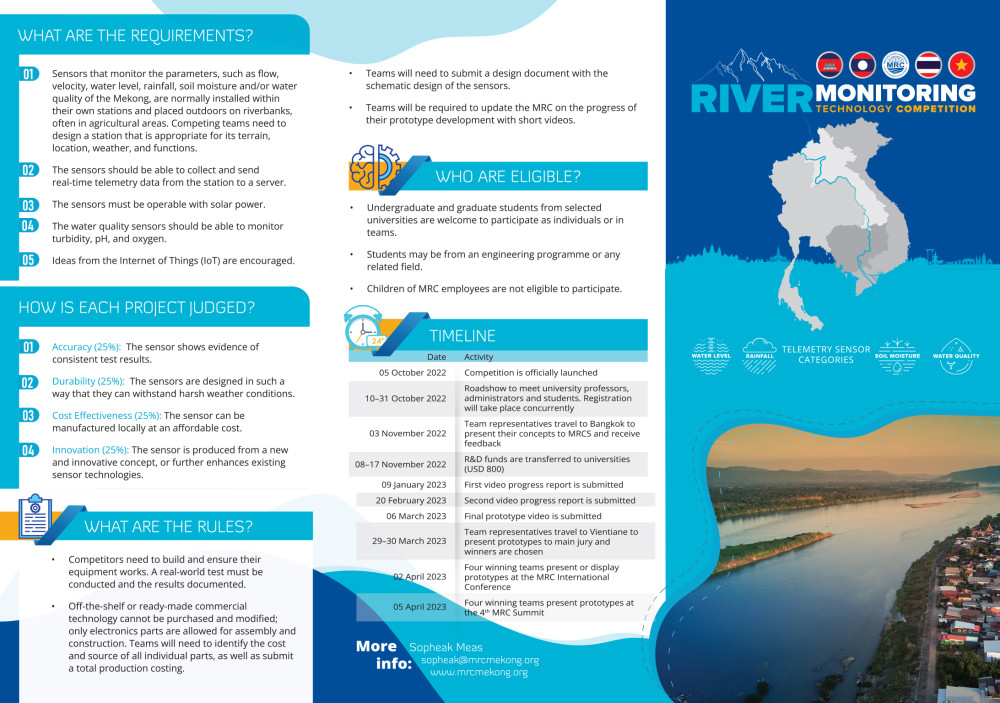MRC unveils unique student competition to modernize Mekong River technology

Listen here
Vientiane, Lao PDR, 6 October 2022 — The Mekong River Commission (MRC) has launched a one-of-a-kind competition that challenges the region’s university students to design cost-effective, sustainable technology to monitor the Mekong’s water level, rainfall, soil moisture and water quality.
The inaugural MRC River Monitoring Technology Competition is aimed at the most innovative Cambodian, Laotian, Thai and Vietnamese students – from one of 15 pre-selected universities across the Lower Mekong River Basin – to help protect the lifeblood for millions of fishing and farming families.
The MRC already maintains some 250 stations that monitor the hydrology, rainfall, water quality, ecological health, fisheries and drought that affect Southeast Asia’s largest river. Yet most of this technology depends on foreign equipment that is often expensive and sometimes outdated.
While the MRC values its international partners, the MRC Secretariat CEO, Dr Anoulak Kittikhoun, says homegrown solutions should deliver cheaper costs, develop local expertise, and offer other benefits – like nurturing the notion that Mekong citizens can solve Mekong problems, via technological innovation.
“We hope to inspire our Mekong youth to achieve their true potential – and provide creative responses that solve many of our vexing challenges,” says Kittikhoun. “This is the time for you, and for us, to prove that we ourselves can develop technology that’s often made far away. You’ll be surprised at how much you can do: for yourself, for your university, for your society, and for the one and only Mekong River.”
For this competition, the specific task is to develop telemetry-sensor technology that measures four separate categories: water level, rainfall, soil moisture, and water quality. Such sensors are typically installed in separate stations, or outdoors on riverbanks, usually in agricultural areas. Competitors should design a station appropriate for its own terrain, location, weather and functions; operable via solar power; and capable of collecting and sending telemetry data from station to server, in real time.
Winning entries will be judged according to their accuracy, durability, cost-effectiveness and innovation.
This contest is open to any undergraduate or graduate student who attends one of 15 university partners, located within the four MRC Member Countries: Cambodia, Lao PDR, Thailand and Viet Nam.
Students may compete as individuals or as a team – under the tutelage of an advisor from their school. Since each university may only propose one team in total, for the four categories, they must help identify the candidates or team with the strongest proposal. The applicant will then be invited to Bangkok to pitch their idea to the MRC Secretariat judges. The accepted project will each receive a grant of USD 800 to research and develop their prototype.
By the end of March, each competitor will present their prototype to a panel of international judges in Vientiane who will select four winning teams – one for each category. The winner will do more than receive an award of USD 5,000; they will also be invited to Vientiane to present their projects in April 2023, at both the 4th MRC Summit and MRC Pre-Summit International Conference – to the regional heads of state and other dignitaries in attendance.
The winners will then work with the MRC to implement their successful technology along the Mekong.
For more on the competition and how to apply, check here.
Download the brochure here.
Read the news in Khmer, Lao, Thai or Vietnamese.
Note to Editors:
The MRC is an intergovernmental organization established in 1995 to boost regional dialogue and cooperation in the Lower Mekong River Basin. Based on the Mekong Agreement among Cambodia, Lao PDR, Thailand and Viet Nam, the MRC serves as both a regional platform for water diplomacy and a knowledge hub – to manage water resources and support sustainable development of the region.
###





